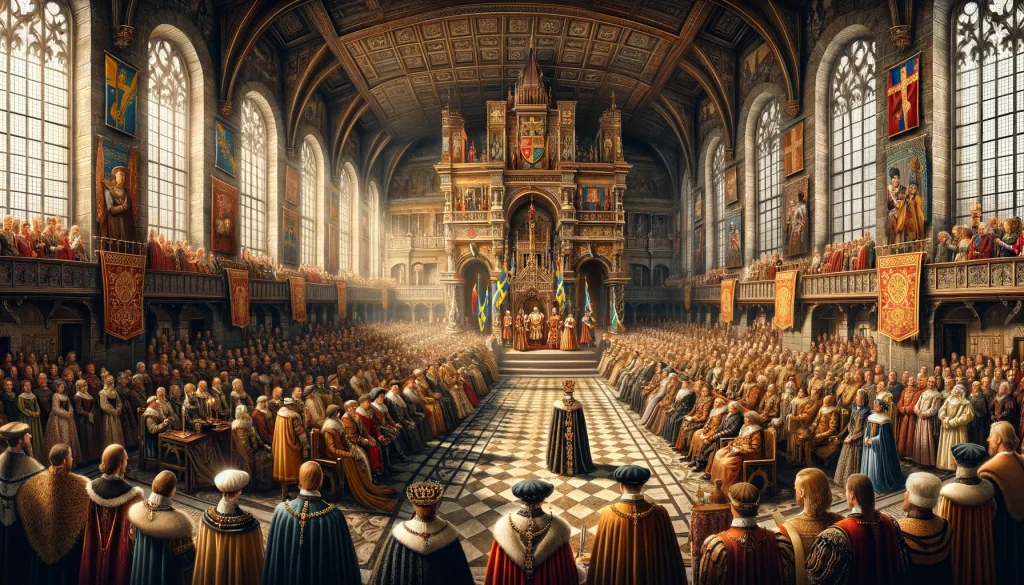Gustav Vasa's background and rise to power
Gustav Eriksson, better known as Gustav Vasa, was born around 1496 and belonged to one of the most prominent noble families in Sweden. His father, Erik Johansson Vasa, was one of the leading opponents of King Christian II of Denmark, who also ruled Sweden through the Kalmar Union. When Christian II conquered Stockholm in 1520, he had many of his opponents executed, including Gustav Vasa's father, in what became known as the Stockholm Massacre. This brutal action created great outrage in Sweden and lit the spark for an uprising.
The beginning of the rebellion and the resistance against the Danes
After the Stockholm massacre, Gustav Vasa fled to Dalarna to seek support for a rebellion against the Danes. Despite a dubious beginning, where he was almost handed over to the Danes, he managed to convince the Dala farmers of the necessity of an uprising. With their support, he was able to launch a successful guerrilla war against the Danish troops. His successes attracted more and more followers, and soon he had a considerable force under his command.
Sweden breaks with the Kalmar union
Gustav Vasa's rebellion and the growing Swedish resistance movement against Danish supremacy led many Swedish citizens and nobles to question the legitimacy of the Kalmar Union. This union, which had been formed in 1397, united the kingdoms of Denmark, Norway and Sweden under a single monarch. But many Swedes felt that the union benefited Denmark at Sweden's expense. Gustav Vasa used this feeling to further strengthen his position and argue for an independent Sweden.
Gustav Vasa's coronation and the centralization of power
On June 6, 1523, Gustav Vasa was crowned King of Sweden in Uppsala, which officially marked the end of the Kalmar Union and the beginning of the Vasa Dynasty. As king, Gustav Vasa worked to centralize power and strengthen royal authority. He implemented a series of reforms, including an ecclesiastical reform in which the church's wealth was confiscated, giving the crown increased financial resources. This reform also led to Sweden breaking with the Catholic Church and becoming Protestant.
Gustav Vasa's economic reforms
To consolidate his rule and secure Sweden's economic independence, Gustav Vasa carried out extensive economic reforms. He introduced a more systematic tax collection and took control of copper mining in Stora Kopparberget, which would become one of Sweden's most important sources of income. Through these measures, the king was able to finance his administration and defense without depending on the nobility.
Legacy and aftermath of Gustav Vasa
Gustav Vasa died in 1560, but his legacy lived on through the Vasa dynasty, which would rule Sweden for over a century. His decision to break with the Kalmar Union and establish Sweden as an independent nation still influences the country's identity today. He is often seen as the founder of modern Sweden and is a central figure in Swedish historiography.
June 6 – Sweden's National Day
In memory of Gustav Vasa's coronation day on June 6, this day is now celebrated as Sweden's national day. Although the day did not become an official national day until 1983, it has long been an important day for Swedes. It recalls Sweden's journey to independence and the role Gustav Vasa played in shaping the country's destiny. The day is filled with festivities and reflection on Sweden's rich history.
Gustav Vasa's relationship with the peasants and nobility
Although Gustav Vasa strengthened the royal power, he also carried out reforms that benefited the peasants, and this created a balanced relationship between the royal power, the nobility and the peasant population. To reduce the power of the nobility, he introduced a series of land reforms that limited their ability to exploit the peasantry. At the same time, he recognized the rights of the farmers and ensured that they had representation in the Riksdag. This combination of centralized royal power and respect for the rights of the peasants created a stable foundation for Swedish society.
Cultural and educational heritage
During Gustav Vasa's reign, culture and education also flourished in Sweden. He commissioned the translation of the Bible into Swedish, which resulted in Gustav Vasa's Bible in 1541. This was not only a religious achievement, but also a linguistic and educational one. The Swedish Bible translation played a central role in standardizing the Swedish language and increasing literacy among the population. This investment in education and culture would be decisive for Sweden's progress in the coming centuries.
Military reforms and Sweden's defence
To secure Sweden's independence and protect the country from external threats, Gustav Vasa carried out significant military reforms. He realized the importance of a strong and well-organized defense and therefore established a standing army. In addition, he modernized the fortifications around the country and established a Swedish navy. These initiatives not only strengthened Sweden's military position in the Nordic region, but also gave the country the tools it needed to become a major power in Europe in the coming centuries.
The reform of the legal system
During Gustav Vasa's rule, the Swedish legal system also underwent significant changes. He introduced laws that modernized the medieval legal system and laid the foundation for a more fair and organized judiciary. These reforms included, among other things, the introduction of written legal texts, which reduced arbitrariness in judicial decisions. He also sought to make the legal system more accessible to the common man by reducing the influence of the nobility over local courts.
Communication and infrastructure
To strengthen his rule and improve communication within the kingdom, Gustav Vasa also laid the foundations for the expansion of Sweden's infrastructure. He realized the importance of good communication routes and therefore started investing in the construction of roads and bridges. In addition, he promoted shipping by building harbors and canals. This investment in infrastructure not only brought economic benefits in the form of increased trade and communication, but also helped to tie together the different parts of the kingdom and strengthen national identity.

